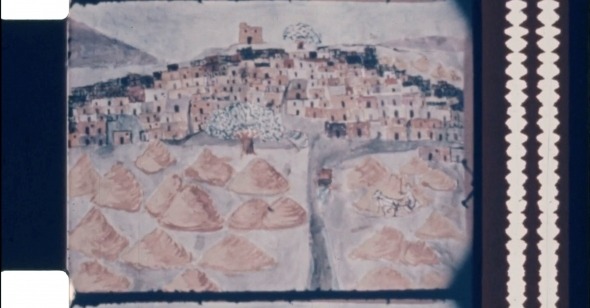Physical Evidence
By Nicholas Russell
R21 AKA Restoring Solidarity
Dir. Mohanad Yaqubi, Palestine/Belgium/Qatar
In his 1969 essay “For an Imperfect Cinema,” Cuban filmmaker Julio García Espinosa writes, “Imperfect cinema is no longer interested in quality or technique. It can be created equally well with a Mitchell or with an 8mm camera, in a studio or in a guerrilla camp in the middle of the jungle…It is not quality which it seeks in an artist's work. The only thing it is interested in is how an artist responds to the following question: What are you doing in order to overcome the barrier of the ‘cultured’ elite audience which up to now has conditioned the form of your work?”
This framework, which Espinosa stresses is anathema to the polish and shine of a Hollywood product, animates the revolutionary underpinnings of Mohanad Yaqubi’s R21 AKA Restoring Solidarity. The documentary functions as a living archive, a collection of 20 films made between 1964 and 1982 reporting, commenting, and philosophizing on the Palestinian struggle. These films, commissioned and collected by the Tokyo office of the Palestinian Liberation Organization (PLO), sat unscreened and moldering for decades in the bedroom of a Japanese professor. Then, an audience member at a Tokyo screening of Yaqubi’s previous film, Off Frame, which itself dove into archival footage of other PLO-related films, reached out to him.
Such a remarkable backstory, itself worthy of a long-form investigation, is largely absent from the film. Instead, Yaqubi threads together footage from each film, voiceover narration floating over aged filmic material—bulldozed settlements, interviews with Yasser Arafat, spokespeople from the Tokyo PLO office, children playing amongst rubble, the inciting history, rendered in black-and-white, of American colonial interferences in both Japan and Palestine. These films, which feature prosaic titles like Palestine and Japan (directed by T. Maki) or Scenes from the Occupation of Gaza (directed by Mustafa Abu Ali), range widely in form and texture: news dispatches by Japanese journalists, a hybrid-narrative drama following the terrible impact of the struggle from the point of view of playing children, propagandistic entreaties for support, some narrated in Arabic, others in English and Japanese. All the while, interstitial shots of the archiving process are woven in between, hands on splicers, digitization machines, unspooled cans of degrading film, knobs turned by faceless bodies. This is dense history, and yet Yaqubi is more interested in creating a tapestry of witnessed moments. Each piece of footage initially comes in chronological order and with it, bits of contextual contemporary narration (apart from the newsreel-like VO endemic to many of the films presented), all of it in Japanese.
It’s from this vantage point, one which takes in the seemingly disparate relationship between Japan and Palestine, that Yaqubi and his team of editors and archivists make plain a stirring, increasingly inspiring history. Inspiring not for the victory of the Palestinian struggle, often depicted as a far-off signifier of political allegiances rather than the humanitarian outrage it so plainly is. Rather, R21’s power rests in its very dissemination, the result of painstaking preservation, the kind that not only makes the material readily accessible, but retains the scratches, missing frames, and time-soiled markings of age. Yaqubi highlights solidarity in a historical mode, the Japanese interest in and identification with Palestine’s fight for sovereignty and global recognition manifesting itself as radical witnessing.
Throughout R21, across a collage of scenes from the 20 films saved, a relationship is reconstructed from the archive, between Japanese allies who embedded themselves in the ruins of Palestine so that they could film firsthand the violence and cruelty of the Israeli occupying forces, and the very subjects the Japanese hoped to aid. The political valence of Yaqubi’s work here is plain, unvarnished, and unwavering. And yet, in keeping with Espinosa’s call for an imperfect cinema that seeks to preserve the integrity of the artwork itself, any authorial claim recedes before the primacy of the films themselves.
Speaking with Filmmaker Magazine about R21’s structure and purpose, Yaqubi said, “The film has a narrative, but that’s not my intention as a filmmaker. I’m trying to expand ways of using archives and producing narratives. I think that in many archive films, people try hard to work creatively with the material and forget that if you just let it speak, it will.” Yaqubi acts as curator rather than art director, each standout sequence presented as merely a glimpse of a larger, unfinished project. The work of preservation, shown in fleeting shots of film reels unspooling, dials turning, software capturing, becomes a metronome, a reminder of the labor behind R21, the nearness of the oblivion of these 20 films. In this way, R21 takes on many forms: a documentary of time and place, yes, but also an unsent love letter between Japan and Palestine, a rediscovered history of the struggle, a record of the previously uncredited artists and filmmakers who sought to keep that history urgent and alive, a triumph of archival stewardship, and, most consequentially, an example of the viability of radical solidarity, through allyship, witnessing, and art. “Art will not disappear into nothingness,” Espinosa writes. “It will disappear into everything.”
